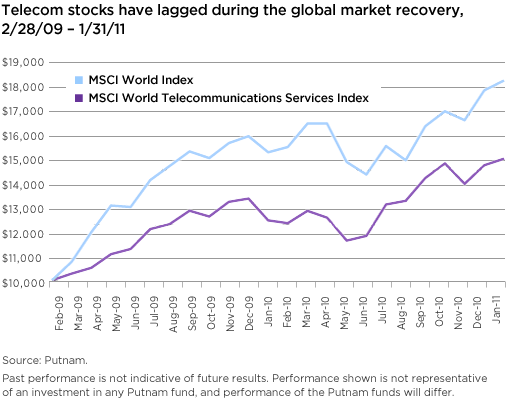The convergence of many types of high bandwidth content — especially video — on mobile devices, tablet computers, and Internet–connected television is generating rapid growth in data traffic on telecommunications networks. Forecasts suggest traffic may grow more than 30% annually over the next several years.
Telecom companies may be able to translate data traffic into profit growth, at a time when valuations in the sector remain attractive. The sector has lagged during the global equity market recovery that began in March 2009.

Convergence is an opportunity for telecom companies to reap greater profits. To do so, they must effectively manage their pricing plans, ensure network quality, invest in new capacity, and navigate government regulations. The companies that can deliver the best quality network service while managing their costs effectively stand to be the winners.
Market skepticism can be seen in the sector's low valuations. In fact, for many telecom companies, the dividend yield of their stock is higher than the yield of their bonds. The average dividend yield of the MSCI World Telecommunications Services Index is above 5% as of December 31, 2010 (Source: MSCI).
The telecom sector today offers investors an attractive level of current income and the opportunity to participate in the potential growth that may come with rapidly increasing data traffic.
Read the full perspective
MSCI World Telecommunications Services Index is a free float-adjusted market capitalization weighted index that is designed to measure the equity market performance of developed markets in the telecommunications sector. MCSI World Index is an unmanaged index of equity securities from developed countries. Securities in the fund do not match those in the index, and performance of the fund will differ. It is not possible to invest directly in an index.
International investing involves certain risks, such as currency fluctuations, economic instability, and political developments. A fund that invests in fewer issuers or concentrates its investments by region or sector, involves more risk than a fund that invests more broadly.
For informational purposes only. Not an investment recommendation.
This material is provided for limited purposes. It is not intended as an offer or solicitation for the purchase or sale of any financial instrument, or any Putnam product or strategy. References to specific asset classes and financial markets are for illustrative purposes only and are not intended to be, and should not be interpreted as, recommendations or investment advice. The opinions expressed in this article represent the current, good-faith views of the author(s) at the time of publication. The views are provided for informational purposes only and are subject to change. This material does not take into account any investor’s particular investment objectives, strategies, tax status, or investment horizon. Investors should consult a financial advisor for advice suited to their individual financial needs. Putnam Investments cannot guarantee the accuracy or completeness of any statements or data contained in the article. Predictions, opinions, and other information contained in this article are subject to change. Any forward-looking statements speak only as of the date they are made, and Putnam assumes no duty to update them. Forward-looking statements are subject to numerous assumptions, risks, and uncertainties. Actual results could differ materially from those anticipated. Past performance is not a guarantee of future results. As with any investment, there is a potential for profit as well as the possibility of loss.
Diversification does not guarantee a profit or ensure against loss. It is possible to lose money in a diversified portfolio.
Consider these risks before investing: International investing involves certain risks, such as currency fluctuations, economic instability, and political developments. Investments in small and/or midsize companies increase the risk of greater price fluctuations. Bond investments are subject to interest-rate risk, which means the prices of the fund’s bond investments are likely to fall if interest rates rise. Bond investments also are subject to credit risk, which is the risk that the issuer of the bond may default on payment of interest or principal. Interest-rate risk is generally greater for longer-term bonds, and credit risk is generally greater for below-investment-grade bonds, which may be considered speculative. Unlike bonds, funds that invest in bonds have ongoing fees and expenses. Lower-rated bonds may offer higher yields in return for more risk. Funds that invest in government securities are not guaranteed. Mortgage-backed securities are subject to prepayment risk. Commodities involve the risks of changes in market, political, regulatory, and natural conditions. You can lose money by investing in a mutual fund.
Putnam Retail Management.






![ESG Materiality: A North Star for multi-asset investors [2023]](/static/img/blogs/perspectives/334257_1200x627.jpg)